高中英语-15-3Lesson-3-Teachers课件-北师大版必修
- 格式:ppt
- 大小:2.01 MB
- 文档页数:38

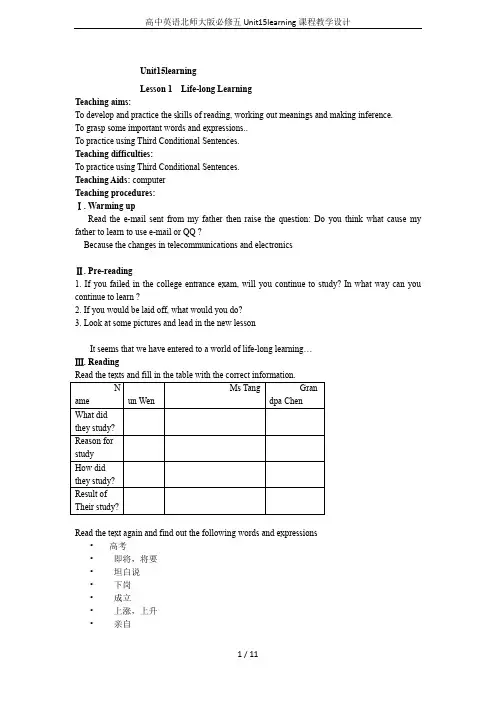
Unit15learningLesson 1 Life-long LearningTeaching aims:To develop and practice the skills of reading, working out meanings and making inference.To grasp some important words and expressions..To practice using Third Conditional Sentences.Teaching difficulties:To practice using Third Conditional Sentences.Teaching Aids: computerTeaching procedures:Ⅰ. Warming upRead the e-mail sent from my father then raise the question:Do you think what cause my father to learn to use e-mail or QQ ?Because the changes in telecommunications and electronicsⅡ. Pre-reading1. If you failed in the college entrance exam, will you continue to study? In what way can you continue to learn ?2. If you would be laid off, what would you do?3. Look at some pictures and lead in the new lessonIt seems that we have entered to a world of life-long learning…Ⅲ. ReadingRead the text again and find out the following words and expressions•高考•即将,将要•坦白说•下岗•成立•上涨,上升•亲自•关掉,不理不睬Ⅳ. Post readingComplete the sentences with the words below.qualification, postage, suspect, aside, secure, frankly, swell, status, throat, blank,1.What is the _____ of your project? Are you finished yet?2. _______ speaking, I don’t really like him at all.3. I like to collect _________ stamps4. _____ from making dinner, she also baked a cake.5. I _______ that Jim stole the book.6. Mary feels very ________ knowing that she has a good job.7. Take a _____ page and write your name at the top.8. A Bachelor of Arts degree is a good ____________ but i t’s not good enough for this job.9. If you have a sore _____ , drink lemon and honey in hot water10. My shoes are too small so when it’s hot and my feet_____, they are really uncomfortable,Ⅴ.AssignmentsLesson 2 Different SchoolTeaching aims:To prepare questions for a listening exercise and to predict contents.To practise using vocabulary of school and education.To practise disagreeing and contradicting politelyTo practise using phrasal verbsTeaching difficulties:To practise disagreeing and contradicting politelyTo practise using phrasal verbsTeaching Aids: computerTeaching procedures:Ⅰ. Warming upLook at the picturesThis is our school, can you describe our school in your own words?The following words may help you:boring, strict, test, homework, traditionalRead these words together and put them under the three headings.Traditional Education:Alternative Education:All Kinds of Education:Ⅱ.ListeningJack had a traditional educational education.Nicholas had an alternative one.Jack and Nicholas who are exchange students from the UK are discussing their learning experience.Listen to the text and do exercise4 and exercise5Jack’s 1. 4. 6Nicholas’ 2. 3. 5Listen the text again and finish exercise6Now listen to the second part of the conversation. Complete the Function File with expressions from the list.not necessarily, I don’t think, one ofthe problems, I’m sorry to disagree, maybe, to a certain extent, not reallyⅢ. SpeakingThink about the questions below. Then in pairs, discuss them. Use expressions from the function file with the correct intonation.1.which school would you prefer to go to? Why ?2.what are the advantages and disadvantages of traditional schooling?3.what are the advantages and disadvantages of alternative schooling?Ⅳ.Complete the sentences with the Phrasal Verbs.catch up with, fall behind,get on with, get together,go on to, go over, look up,put off, put on, set up, take upComplete the passage with the following words and phrases.to a certain extent, select,misunderstand, reputation, mild, assignment, slight, looseⅤ. AssignmentsLesson 3 TeachersTeaching aims:To practise using “wish” and “should” to express regretTo practise disagreeing and contradictingTeaching difficulties:To practise using “wish” and “should” to express regretTeaching Aids: computerTeaching procedures:Ⅰ. Warming up1. Who was your favorite teachers at primary school?2. Why did you like him/her?3. Guess. Will your teacher still remember you? Were you a good students for him/her?Ⅱlisten and readListen, read the text and decide whether the statements are true or false.1.Mr Jenkin made class lively but Graham didn’t like science.2. As a science teacher Mr Jenkin often shows and explains how something work or how to do something.3….4…5…..6….7….Read the text again and answer the following questions.1.What kind of student was Graham?2.What kind of teacher was Mr Jenkins in Graham’s eyes?3.Why does Graham often think about Mr Jenkins?4.Is Mr Jenkins still a great help to Graham? How?5.How does Mr Jenkins feel about Graham now?6. Why does Mr Jenkins love teaching?Ⅲ. Language points1.suppose + that 认为,假定sb./sth. to be 认为某人,某物是…•I don’t suppose I’ll trouble you again.•You are supposed to start work at 8:30 every morning.2.make everything interestingThe teacher make us finish the homework.What made you so frightened?We made it a rule that everyone should be on time.•We decided to make him our chairman3. I wish I was as successful…as I was with…•He is as good a teacher as father.•He doesn’t go home as much as he used to.•Please take as many books as you want.•You can take as many as ten books.as +adj,+a/an +n. + as 和…一样是一个…as +adj/adv. + as 和…一样as +many/much as sb. want 想要多少..就有多少…as +many/much/far + as 多达/远达…•他和郭锋一样是个好歌手•这道题没那道题难•你想喝多少牛奶就喝多少.•你最多可以喝3杯牛奶.•He is as good a singer as Guofeng.This problem isn’t as/so difficult as that one.Please drink as much milk as you want.You can drink as much as 3 cups of milk.4.The thing about being a teacher…have access to•I have access to his office.•I wish I could have free access to KFC.•I do hope you can have access to the university•5.Wish to do, sb to do, sb.+ n. /adj., that•I wish to have a new swatch.•I wish him to go, he shouldn’t stay.•Wish you a happy weekend.•I wish I were you. You are a lucky dog.•The meeting was so terrible, I wished I hadn’t attended it.•I wish I could pass the lawyer certification exam next year. Ⅳ. GrammarⅤ. AssignmentsLesson 4 UnderstandingObjectivesTo practise using linking and reference words to help understand a text.To practise using adverbs.To make students know how to gain knowledge.Ⅱ. Warming upQuestion students: By what ways do we acquire knowledge?Reading booksWatching TVGoing through the InternetLearning from teachers or friendsListening to radioⅢ. Pre-reading1. Can you think of the process/way to gain/understand knowledge?2. Which of these things help you to understand things?1) being relaxed and happy2) having time to think about whatyou are learning3) being interested in the topic4) discussing topics with friends5) asking questions3. Will you completely believe in what your teachers said? What about the great scientist? Will you fully believe in them?We have our understanding about things, but we are always affected by the authorities and lose our thoughts. It seems that not all that the great people said is correct.Do you believe the following sentences said by the great?Knowledge is power.Truth is the daughter of time, not of authority.All truths are easy to understand once they are discovered; the point is to discover them Earth must be the centre of the universe because it felt like the earth was standing stillEarth must be the centre of the universe because it felt like the earth was standing stillⅣ.Reading(I).Read the text and answer the following questions.1)Does the writer believe that the Baconian Method of scientific thought is a good way to gain knowledge?2) What image does the writer use to explain how men like Bacon and Galileo helped educate people?3) Why did Aristotle assume that the sun moved around the Earth?4) Would the writer d escribe the people of the church during Galileo’s time as having ‘open’ or ‘closed’ minds?5) Do you think people like Bacon and Galileo would have thought it was a good idea to open libraries and set up universities? Why?(II).Read texts 1-4Which of the underlined linking words mean the same as these? Example as = whenafterwards, but, since, so he could, so, to start with, when, next(Ⅲ).V ocabulary: Words about learning, Ex.5(Ⅳ).Complete the sentences with the correct form of the words below. Ex.6Ⅴ.Language pointsⅥ. AssignmentsUnit 15 LearningCommunication Workshopwriting(1).三维目标1.to participate in a debate.2. to practice exchangeing views.3. to practice using speaking strategies for debate.(2)教学重点1. improve the students’ integrating skills.(3) 教学难点1.some students may still feel they need to understand every word in reading text in order to do the exercises.2. how to write a personal essay .Task 1: Read the essay and match the headings with paragraphsPara. 1Para. 2Para. 3Para. 4Para. 5FacilitiesAfter-school activitiesTimetablelocationAim of the essayconclusionTask 2: Read the essay again and decide whether the statements below are True (T) or False (F). ( ) 1.My perfect school would be in the center of the city, but far away from a big park. ( ) 2. My perfect school would have a language lab.( ) 3. Students would study all the school subjects and optional subjects.( ) 4. There would be many after—school groups in my perfect school.Task 3: Read the essay again and find out the linking words and expressions underlined in the essay show:Addition: Also, another thing, as well asExamples: For example, such asConclusion: In conclusionContrast: But, howeverPurpose: So thatWriting:You must have known how to write a personal essay now, so let’s have a try!Write an essay describing your perfect school, following the writing stages on Page45. Before writingWrite some notes about your imaginary school.Location: in the center of cityFacilities: a big playground, a language lab,basketball courts, …Timetable: biology, …After-school activities: music club, …Teachers: …writingMy perfect school would be in the centre of the city. The school would have a big playground so that students could play ball games there. There would also be computers in all the classrooms. Students would study all the school subjects such as Chinese, math, English, physics and chemistry. There would also be some new optional subjects for students to choose. The teachers高中英语北师大版必修五Unit15learning课程教学设计there would be mild and kind. There would be some after—school interest groups.In conclusion, I think my school would have a good variety of activities—something for everyone.11 / 11。

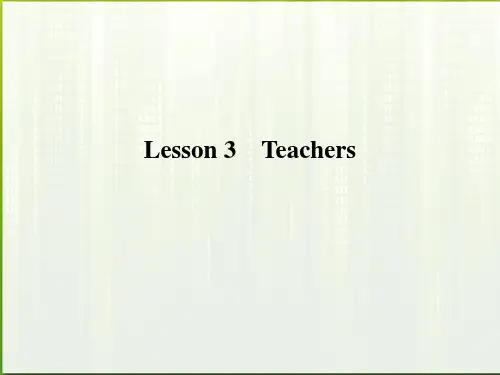


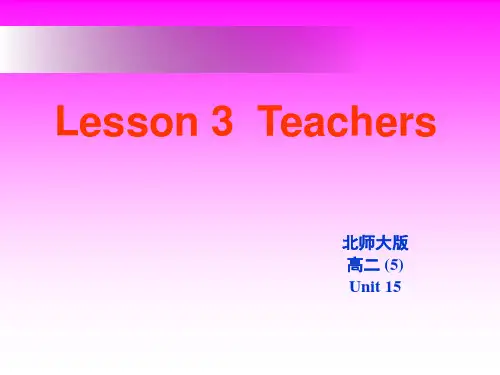
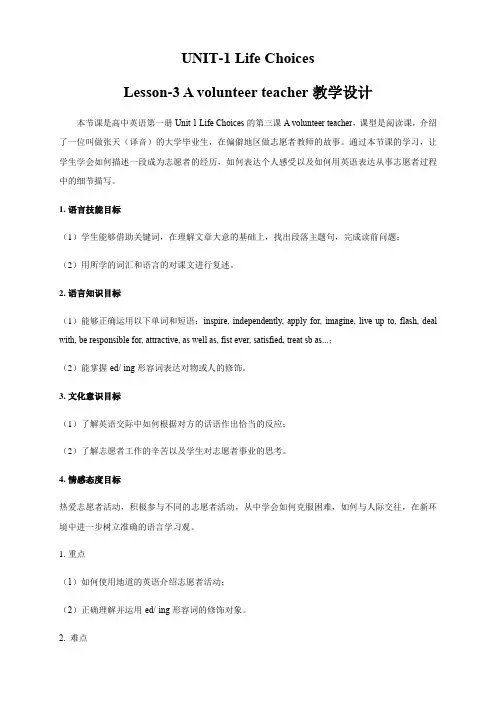
UNIT-1 Life ChoicesLesson-3 A volunteer teacher教学设计本节课是高中英语第一册Unit 1 Life Choices的第三课A volunteer teacher,课型是阅读课,介绍了一位叫做张天(译音)的大学毕业生,在偏僻地区做志愿者教师的故事。
通过本节课的学习,让学生学会如何描述一段成为志愿者的经历,如何表达个人感受以及如何用英语表达从事志愿者过程中的细节描写。
1.语言技能目标(1)学生能够借助关键词,在理解文章大意的基础上,找出段落主题句,完成读前问题;(2)用所学的词汇和语言的对课文进行复述。
2.语言知识目标(1)能够正确运用以下单词和短语:inspire, independently, apply for, imagine, live up to, flash, deal with, be responsible for, attractive, as well as, fist ever, satisfied, treat sb as...;(2)能掌握-ed/-ing形容词表达对物或人的修饰。
3.文化意识目标(1)了解英语交际中如何根据对方的话语作出恰当的反应;(2)了解志愿者工作的辛苦以及学生对志愿者事业的思考。
4.情感态度目标热爱志愿者活动,积极参与不同的志愿者活动,从中学会如何克服困难,如何与人际交往,在新环境中进一步树立准确的语言学习观。
1.重点(1)如何使用地道的英语介绍志愿者活动;(2)正确理解并运用-ed/-ing形容词的修饰对象。
2. 难点(1)能用得体的英语表达自己从事志愿者活动的细节、个人情感;(2)能正确识别-ed/-ing形容词的修饰对象并准确使用。
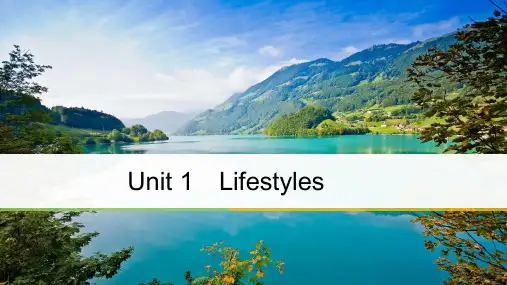
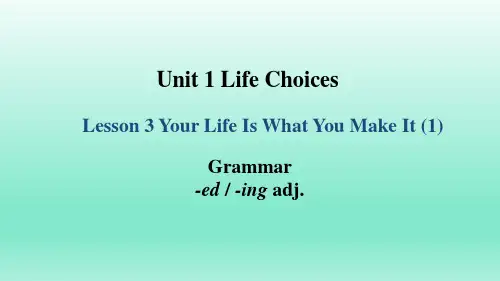
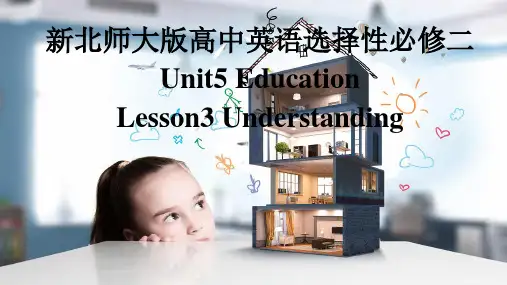
北师大版高中英语新教材(选择性必修第一册)课文(Unit 3 | LESSON 1)Lesson 1 The Sixth Extinction第一课第六次灭绝Extinctions, where entire species are wiped out, are not unusual in our Earth’s history. In fact, over 90 percent of all species that ever lived are now extinct. In the last 500 million years, there have been five times when life on Earth has almost ended. These include the third mass extinction, known as the “Great Dying”, which killed 90% to 96% of all species. And the fifth event, whichoccurred 66 million years ago, caused the death of the dinosaurs. The reasons for extinctions are varied. According to scientists, they include volcanic eruptions, asteroids hitting the Earth from space, changes in sea levels, the decrease of the oxygen content of the sea and global warming. Many scientists say we are now entering the Earth’s sixth mass extinction. This time, human activity will be to blame.物种灭绝,即某个物种的完全消失,在地球的历史上并不罕见。